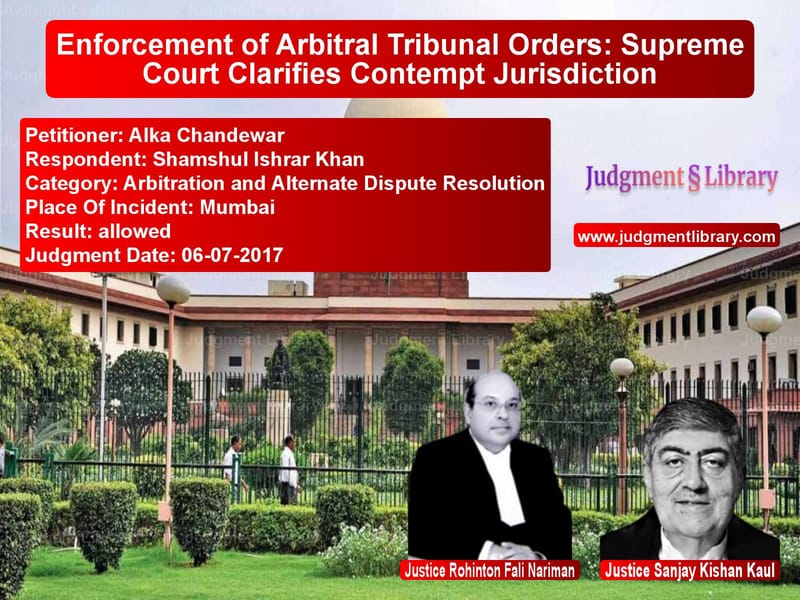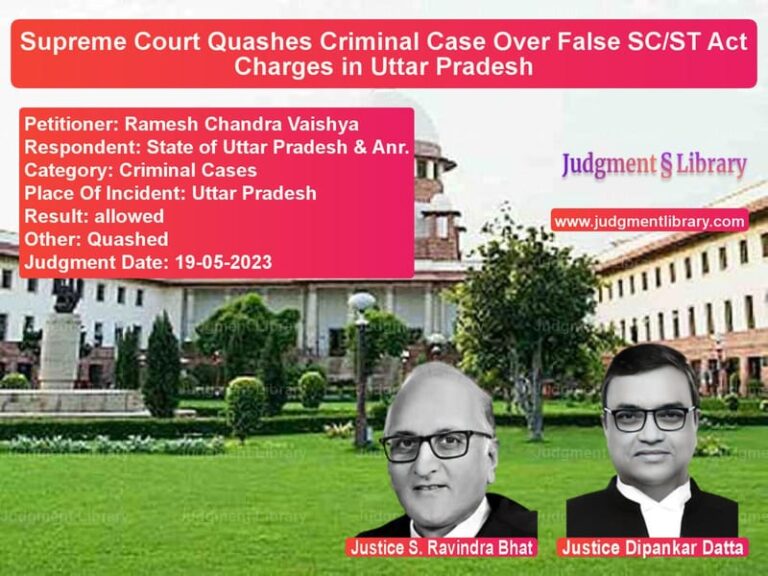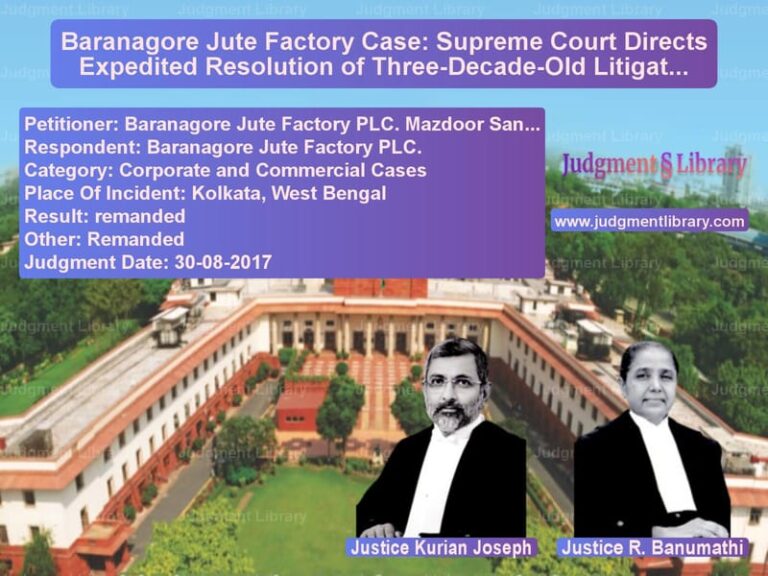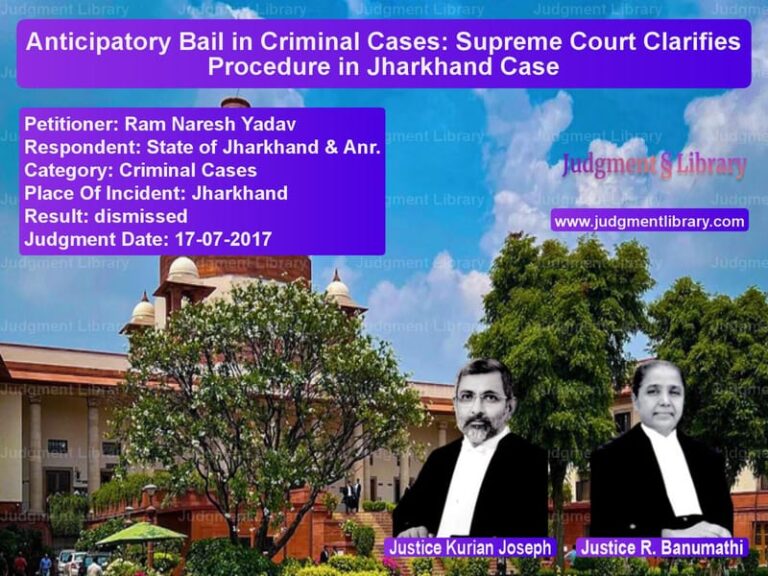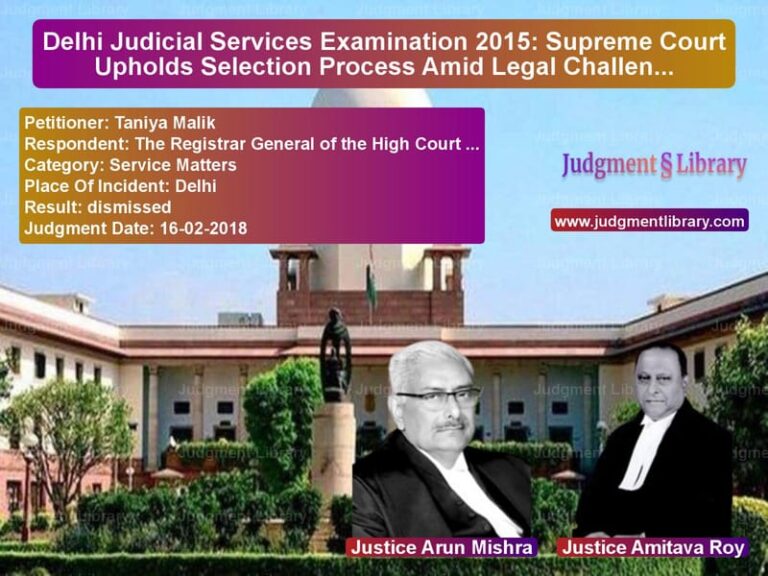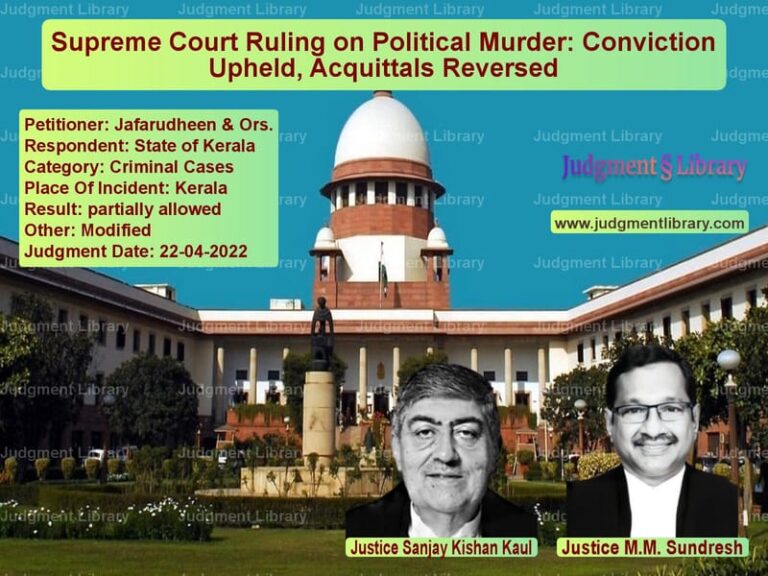Enforcement of Arbitral Tribunal Orders: Supreme Court Clarifies Contempt Jurisdiction
The Supreme Court’s judgment in Alka Chandewar vs. Shamshul Ishrar Khan, delivered on July 6, 2017, clarified the legal position regarding the enforcement of interim orders issued by an arbitral tribunal. The ruling addressed whether a party violating such an order could be held in contempt of court under Section 27(5) of the Arbitration and Conciliation Act, 1996. The Court overruled a restrictive interpretation by the Bombay High Court and reinforced the enforceability of tribunal orders.
The dispute arose when the respondent allegedly violated an arbitral tribunal’s interim order prohibiting the disposal of certain flats. The arbitrator referred the contempt to the High Court under Section 27(5). The High Court dismissed the reference, holding that Section 27(5) applied only to assistance in taking evidence, not violations of interim orders. The Supreme Court overturned this decision, reaffirming that contempt jurisdiction applies to violations of tribunal orders.
Background of the Case
The case involved a real estate transaction where the appellant, Alka Chandewar, and the respondent, Shamshul Ishrar Khan, had a dispute over property dealings. The matter was referred to arbitration, and on October 7, 2010, the sole arbitrator issued an interim order restraining the respondent from disposing of certain flats without tribunal approval. However, the respondent allegedly sold five flats in violation of this order.
Key events in the case were:
- October 7, 2010: Arbitral tribunal issued an interim order restraining disposal of flats.
- October 14, 2010: Respondent allegedly violated the order by selling five flats.
- March 22, 2012: Arbitrator found the respondent in violation of the order.
- May 5, 2014: Arbitrator referred the contempt matter to the High Court under Section 27(5).
- October 27, 2015: Bombay High Court ruled that Section 27(5) applied only to assistance in taking evidence, not violations of interim orders.
- July 6, 2017: Supreme Court overturned the High Court’s ruling and reinstated contempt jurisdiction.
Arguments by the Petitioner (Alka Chandewar)
The petitioner argued:
- Sections 9 and 17 of the Arbitration Act provide alternative remedies, allowing parties to seek interim relief either from courts or tribunals.
- If tribunal orders cannot be enforced, Section 17 would become meaningless.
- Section 27(5) explicitly provides contempt jurisdiction for violations of tribunal orders.
- The High Court’s interpretation of Section 27(5) was unduly restrictive and ignored the plain language of the law.
Arguments by the Respondent (Shamshul Ishrar Khan)
The respondent contended:
- Section 27(5) applies only to assistance in taking evidence, not violations of tribunal orders.
- The arbitral tribunal lacked inherent contempt powers, and enforcement must be sought separately through courts.
- The 2015 amendment to Section 17(2) provided a separate mechanism for enforcement, making reliance on Section 27(5) unnecessary.
- The High Court correctly ruled that the tribunal could not refer a contempt case to the court.
Supreme Court’s Observations
The Supreme Court, comprising Justices Rohinton Fali Nariman and Sanjay Kishan Kaul, made the following key observations:
“If interim orders passed by the arbitral tribunal are unenforceable, they would be mere ropes of sand, rendering Section 17 otiose.”
“Section 27(5) clearly states that persons guilty of contempt during the conduct of arbitral proceedings fall within its ambit.”
“The modern rule of statutory interpretation requires courts to ensure that provisions are effective rather than rendered useless.”
Supreme Court’s Judgment
The Supreme Court ruled that:
- Section 27(5) allows contempt proceedings for violations of tribunal orders, not just assistance in taking evidence.
- The High Court’s restrictive reading of the law was incorrect.
- Arbitration orders must be enforceable to maintain the integrity of the process.
- The matter was remanded to the High Court for reconsideration on the issue of contempt.
Key Takeaways
- Tribunal Orders are Enforceable: The ruling affirms that arbitral tribunals have effective enforcement mechanisms.
- Section 27(5) Includes Contempt Jurisdiction: The provision is not limited to assistance in taking evidence.
- Strengthening Arbitration: The decision reinforces the credibility of arbitration as an effective dispute resolution mechanism.
- Judicial Interpretation: The Court emphasized a modern interpretive approach that ensures provisions serve their intended purpose.
Impact of the Judgment
The ruling significantly impacts arbitration law by ensuring:
- Parties cannot disregard tribunal orders without consequences.
- Courts can enforce arbitration orders through contempt proceedings.
- Arbitration remains a viable alternative to litigation.
Conclusion
The Supreme Court’s judgment in Alka Chandewar vs. Shamshul Ishrar Khan provides a crucial precedent for arbitration enforcement in India. By upholding the contempt jurisdiction of courts for violations of tribunal orders, the ruling strengthens the arbitration process and ensures compliance with interim measures. This decision ensures that arbitration remains an effective and respected mode of dispute resolution.
Don’t miss out on the full details! Download the complete judgment in PDF format below and gain valuable insights instantly!
Download Judgment: Alka Chandewar vs Shamshul Ishrar Khan Supreme Court of India Judgment Dated 06-07-2017.pdf
Direct Downlaod Judgment: Direct downlaod this Judgment
See all petitions in Arbitration Awards
See all petitions in Dispute Resolution Mechanisms
See all petitions in Enforcement of Awards
See all petitions in Judgment by Rohinton Fali Nariman
See all petitions in Judgment by Sanjay Kishan Kaul
See all petitions in allowed
See all petitions in supreme court of India judgments July 2017
See all petitions in 2017 judgments
See all posts in Arbitration and Alternate Dispute Resolution Category
See all allowed petitions in Arbitration and Alternate Dispute Resolution Category
See all Dismissed petitions in Arbitration and Alternate Dispute Resolution Category
See all partially allowed petitions in Arbitration and Alternate Dispute Resolution Category

